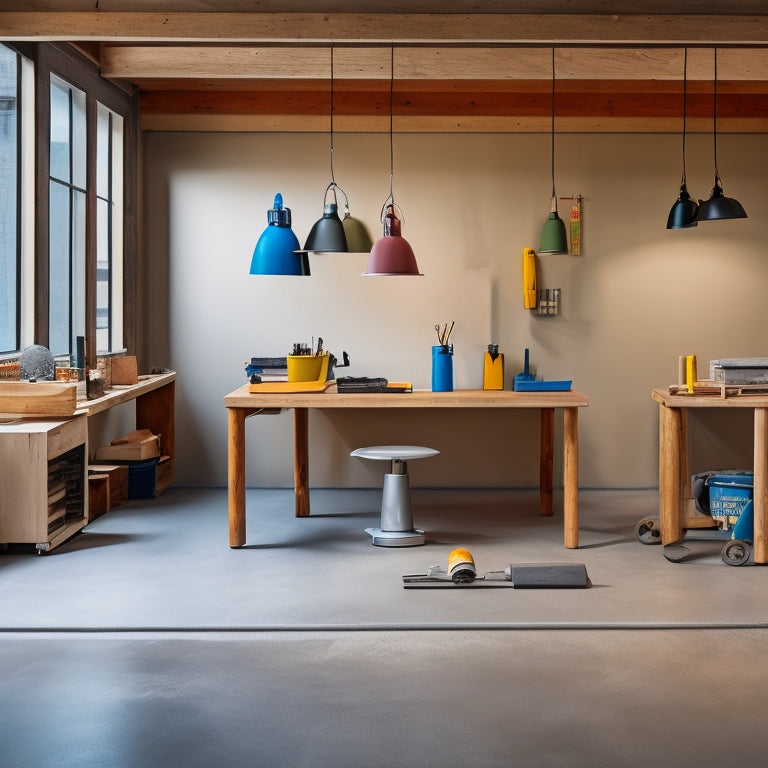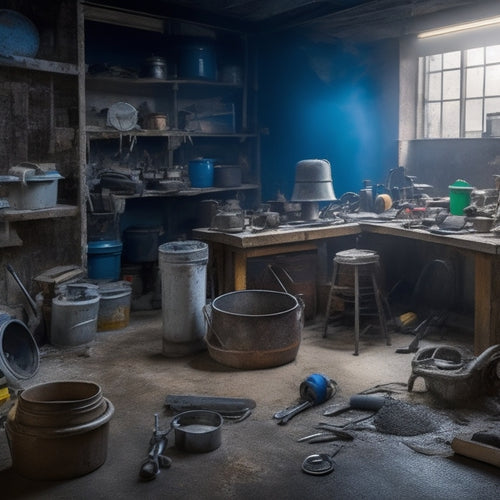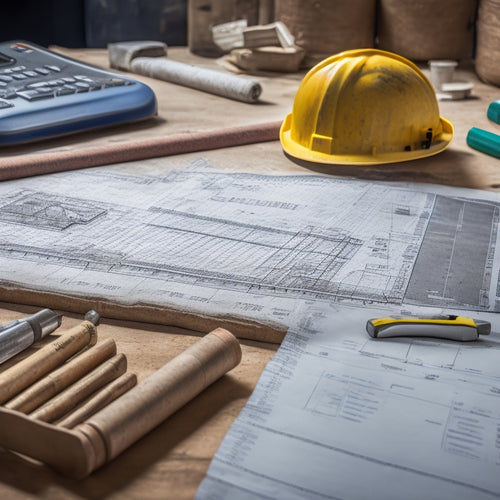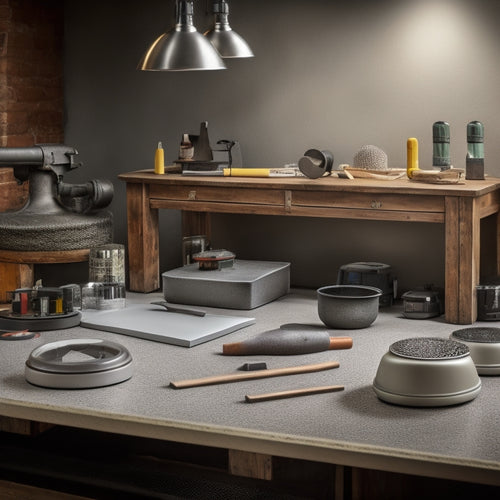
Why Choose the Right Concrete Floor Finishing Tools
Share
You need the right concrete floor finishing tools to guarantee a strong, durable bond between the concrete and finishing material, and to achieve a smooth, even surface that meets your desired finish and quality standards. With so many tool options available, it's essential to choose the right ones for your project. Proper tool selection impacts the entire finishing process, from surface preparation to final results. By understanding the importance of tool materials, operator skill levels, and job site conditions, you can make informed decisions that lead to superior finishes. Now, explore the key factors that will take your concrete floor finishing projects to the next level.
Key Takeaways
• Proper floor preparation and tool selection ensure a strong, durable bond between concrete and finishing material, preventing delamination and peeling.
• The right tools help achieve desired finishes, reduce labor time, and enhance overall project quality, making them a worthwhile investment.
• High-quality tools reduce maintenance and repair expenses, leading to cost-effectiveness and increased customer satisfaction through better results.
• Choosing the right tools prevents common mistakes, such as poor finishes, wasted time, and compromised safety, ensuring a successful project outcome.
• The correct tools for specific floor types, such as polished or stamped concrete, ensure professional-looking results and meet project requirements efficiently.
Importance of Proper Floor Preparation
Before applying a concrete floor finish, you must meticulously prepare the surface to guarantee a strong, durable bond between the concrete and the finishing material. This vital step, known as floor surface preparation, sets the stage for a successful finishing process.
You'll need to examine the concrete substrate to identify any imperfections or weaknesses that could compromise the finish. This involves evaluating the surface for cracks, unevenness, and other defects that may affect the bonding process.
You should also check the concrete's moisture levels, as excessive moisture can cause the finish to peel or delaminate. A thorough cleaning of the surface is also essential to remove dirt, oil, and other contaminants that might interfere with the bonding process.
By conducting a thorough concrete substrate examination, you'll be able to identify and address any potential issues before applying the finish, ensuring a strong, long-lasting bond.
Types of Concrete Finishing Tools
As you navigate the world of concrete floor finishing, you'll encounter a range of tools designed to help you achieve a smooth, even surface.
You'll need to select the right tamping tool options to guarantee proper consolidation, as well as edging and jointing tools to define the floor's edges and joints.
Next, you'll choose from various finishing blade types to achieve the desired level of gloss and texture.
Tamping Tool Options
You'll find three primary tamping tool options in the market, each designed to achieve a specific finish and texture on your concrete floor. When selecting a tamping tool, evaluate the type of finish you want to achieve and the ergonomics of the tool.
Here are four key factors to evaluate when choosing a tamping tool:
-
Handle material and design: Look for tools with ergonomic handles that reduce fatigue and provide a comfortable grip.
-
Tamping head size and shape: The size and shape of the tamping head will affect the finish and texture of your concrete floor.
-
Tamping technique: Different tamping techniques, such as walking or kneeling, require specific tool designs.
- Weight and balance: A well-balanced tool with the right weight distribution will make it easier to achieve a consistent finish.
Edging and Jointing
When it comes to creating clean, defined edges and joints in your concrete floor, the right edging and jointing tools are essential. You'll want to invest in tools that can help you achieve precise control and consistency, guaranteeing a professional-looking finish.
Edging techniques, such as using an edger or a joint cutter, allow you to create clean, defined edges around walls, columns, and other obstructions. These tools are designed to remove excess concrete and create a smooth, even surface.
Jointing methods, on the other hand, involve cutting and filling joints to control cracking and improve the overall durability of your concrete floor. You'll need jointing tools, such as joint chisels or joint saws, to cut and prepare the joints for filling.
Finishing Blade Types
Precision is paramount in concrete finishing, and selecting the right blade type is critical to achieving a high-quality, defect-free surface. As you navigate the world of concrete finishing, you'll encounter various blade types designed to tackle specific tasks. Understanding the differences between them will help you make informed decisions and achieve ideal results.
Here are four key blade types to take into account:
-
Diamond blades: Ideal for grinding and polishing, these blades feature diamond-coated edges that effectively remove imperfections and leave a smooth finish.
-
Segmented blades: Designed for heavy-duty concrete removal, these blades have a serrated edge that breaks up concrete quickly and efficiently.
-
Turbo blades: With their unique blade shape and aggressive cutting action, turbo blades are perfect for removing old coatings, adhesives, and surface imperfections.
- PCD (Polycrystalline Diamond) blades: These ultra-durable blades are designed for heavy-duty grinding and polishing, offering exceptional wear resistance and long lifespan.
When choosing a blade type, take into account the specific task at hand, as well as the blade materials and shapes that will best suit your needs. By making an informed decision, you'll be well on your way to achieving a flawless concrete finish.
Choosing the Right Tool Materials
Selecting the right tool materials is essential, as they directly impact the performance, durability, and maintenance of your concrete floor finishing tools. You'll want to take into account various tool material types, each with its strengths and weaknesses.
For instance, steel tools are durable and resistant to wear, but may be prone to rust. Carbide-tipped tools, on the other hand, offer exceptional hardness and resistance to abrasion, making them ideal for aggressive grinding and polishing. Ceramic tools, meanwhile, provide a high-quality finish and are resistant to corrosion.
When choosing a tool material, you should also take into account tool longevity considerations. Will the tool be used frequently or occasionally? Will it be exposed to harsh environmental conditions? Answering these questions will help you determine the most suitable tool material for your specific needs.
Factors Affecting Tool Performance
When selecting concrete floor finishing tools, you're not just considering the tool itself, but also the factors that impact its performance.
You'll need to evaluate the quality of the tool material, your own skill level as an operator, and the conditions of the job site.
Tool Material Quality
You'll find that the performance of your concrete floor finishing tools largely depends on the quality of their materials, which can greatly impact the outcome of your project. The materials used in your tools can affect their durability, efficiency, and overall performance.
When it comes to tool material quality, here are some key considerations:
-
Durability: Tools made with high-quality materials are more likely to withstand the rigors of concrete floor finishing, reducing the need for frequent replacements.
-
Material compatibility: Verify that the tool materials are compatible with the concrete and any other materials you're working with to prevent damage or corrosion.
-
Heat resistance: Some tools, like grinders and saws, generate heat during use. Look for materials that can withstand high temperatures to prevent tool failure.
- Corrosion resistance: Tools exposed to harsh chemicals or water can corrode quickly. Choose materials that resist corrosion to extend the tool's lifespan.
Operator Skill Level
Your level of expertise in operating concrete floor finishing tools greatly impacts their performance, as even the highest-quality tools can be rendered ineffective by an inexperienced or unskilled operator. The operator's experience level and training play a crucial role in achieving ideal results. A well-trained operator can efficiently utilize the tool's capabilities, while an unskilled operator may struggle to produce acceptable results.
| Operator Training | Experience Level | Expected Results |
|---|---|---|
| Basic | Beginner | Subpar finish, increased labor time |
| Advanced | Intermediate | Good finish, moderate labor time |
| Expert | Advanced | High-quality finish, efficient labor time |
As the table illustrates, operator training and experience level have a direct impact on the quality of the finish and labor time. Investing in operator training can greatly improve the overall performance of your concrete floor finishing tools. It is vital to assess your operator's skill level and provide necessary training to guarantee they can effectively utilize the tools. By doing so, you can enhance your tool's performance, reduce labor time, and achieve high-quality results.
Job Site Conditions
Concrete floor finishing tools are only as effective as the environment in which they're used, and job site conditions can greatly impact their performance. You need to take into account the environmental factors that can affect your tools' efficiency. For instance, extreme temperatures, humidity, and exposure to weather conditions can alter the concrete's properties, making it challenging to achieve the desired finish.
Here are some key job site conditions to keep in mind:
-
Site accessibility: Confirm that your tools can easily reach the work area, and that there's sufficient space to maneuver.
-
Surface preparation: The quality of the concrete substrate can greatly impact tool performance. Make sure the surface is clean, dry, and free of any contaminants.
-
Moisture levels: Excessive moisture can hinder the finishing process, so it's crucial to monitor the concrete's moisture levels and adjust your tools accordingly.
- Power supply: Ensure a reliable and consistent power supply to avoid tool failure or downtime.
Floor Finishing Tool Maintenance Tips
Regular cleaning and lubrication of your floor finishing tools guarantees peak performance and extends their lifespan. You can't afford to overlook tool cleaning, as it's vital for removing dirt, grime, and other contaminants that can compromise tool performance.
Create a maintenance schedule to guarantee your tools receive regular cleaning and lubrication. This schedule should include daily, weekly, and monthly tasks to keep your tools in top condition.
For daily tasks, wipe down tools with a clean cloth and apply a rust inhibitor to metal components. Weekly tasks may involve disassembling tools to clean hard-to-reach areas, while monthly tasks should focus on lubricating moving parts and checking for wear and tear.
By following this maintenance schedule, you'll prevent tool failure, reduce downtime, and maintain a high level of productivity on the job site.
Benefits of High-Quality Tools
With high-quality tools in your arsenal, you'll experience a significant boost in productivity, efficiency, and overall quality of work, ultimately leading to better results and increased customer satisfaction. This is because high-quality tools are designed to perform at their best, allowing you to complete tasks quickly and accurately.
Here are some benefits you can expect:
-
Tool longevity: High-quality tools are built to last, reducing the need for frequent replacements and saving you money in the long run.
-
Cost effectiveness: While high-quality tools may have a higher upfront cost, they often provide long-term savings through reduced maintenance, repair, and replacement costs.
-
Improved accuracy: High-quality tools are designed for precision, ensuring that your work meets the highest standards of quality.
- Enhanced safety: High-quality tools are designed with safety in mind, reducing the risk of accidents and injuries on the job site.
Common Mistakes to Avoid
When selecting concrete floor finishing tools, you're likely to encounter pitfalls that can compromise the quality of your work, so it's vital to be aware of common mistakes to avoid.
One common misconception is that all tools are created equal, and that any tool will get the job done. However, this couldn't be further from the truth. The wrong tool can lead to subpar results, wasted time, and even damage to the floor.
Another mistake to avoid is rushing through the tool selection process. It's important to take the time to research and understand the specific requirements of your project, including the type of concrete, the desired finish, and the environmental conditions. This will help you choose the right tool for the job, guaranteeing that you achieve the desired results efficiently and effectively.
Tool Selection for Specific Floors
You'll need to tailor your tool selection to the specific type of floor you're working with, as different floors demand distinct techniques and tools to achieve ideal results. For instance, a floor requiring a high-gloss finish will need a different set of tools than one requiring a matte finish.
Here are some specific considerations for common floor types:
-
Polished concrete floors: These require specialized textures and surface durability, which demand the use of high-speed grinders and polishing pads.
-
Stamped concrete floors: These need tools that can create unique patterns and textures, such as stamping mats and texture skins.
-
Exposed aggregate floors: These require tools that can effectively remove the surface layer of concrete, such as scarifiers and grinders with specialized blades.
- Epoxy-coated floors: These need tools that can apply the epoxy coating evenly and smoothly, such as notched trowels and epoxy applicators.
Frequently Asked Questions
Can I Use a Single Tool for All Concrete Floor Finishing Tasks?
You'll struggle to find a single tool that excels in all concrete floor finishing tasks, as each task demands specific features; prioritize tool versatility and task efficiency by selecting the right tool for each job to achieve ideal results.
Are Expensive Tools Always Better Than Cheaper Alternatives?
You shouldn't assume expensive tools are always better; consider factors like tool longevity and brand reputation. A reputable brand's mid-range tool might outlast a cheap alternative, providing better value in the long run.
How Do I Know When to Replace My Concrete Floor Finishing Tools?
"When your trusty tools start to show their age, like a worn-out shoe, it's time to take action. You'll know it's replacement time when you notice signs of wear, and tool maintenance tips aren't cutting it, so don't wait until they fail you on the job."
Can I Finish a Concrete Floor Without Using Specialized Tools?
You can attempt to finish a concrete floor without specialized tools, but be prepared for subpar results; alternative methods and DIY techniques exist, though they're often time-consuming and may not yield the desired finish.
Do All Concrete Floor Finishing Tools Require Extensive Training?
You'll find that not all concrete floor finishing tools require extensive training, but achieving tool proficiency demands understanding specific training requirements, which vary depending on the tool's complexity and your level of expertise.
Conclusion
You've invested time and money into your concrete floor, and now it's time to reap the benefits. But, without the right finishing tools, your floor's full potential will remain unrealized, stuck in a world of dullness and imperfection.
On the other hand, with the perfect tools, your floor will shine like a masterpiece, a demonstration of your attention to detail and commitment to excellence.
Choose wisely, and reveal the secrets to a floor that's truly breathtaking.
Related Posts
-

7 Tools to Fix Damaged Concrete Floors
You're about to tackle that damaged concrete floor, and the right tools are essential for a successful repair. Start ...
-

5 Tips for Accurate Concrete Measurement Tools
To guarantee accurate concrete measurement, you'll want to calibrate your measuring tools regularly, choosing a frequ...
-

10 Best Tools for Sealed Concrete Finishing Success
When it comes to sealed concrete finishing success, you need a robust arsenal of specialized tools. Start with essent...


